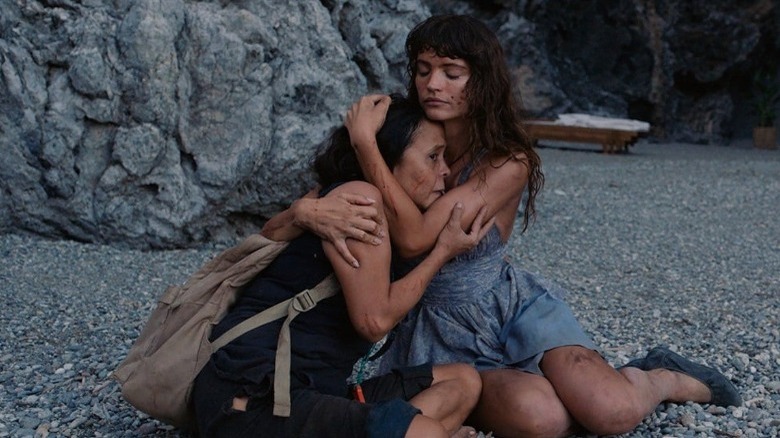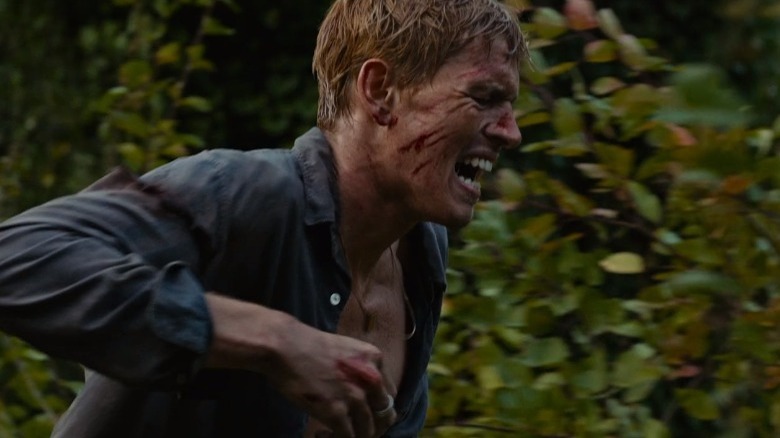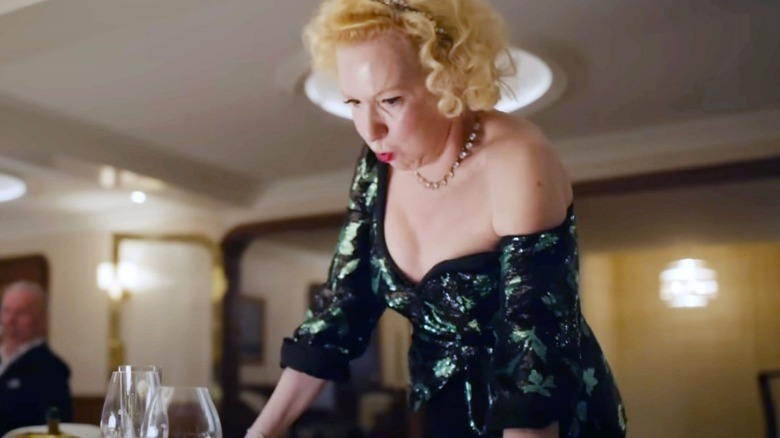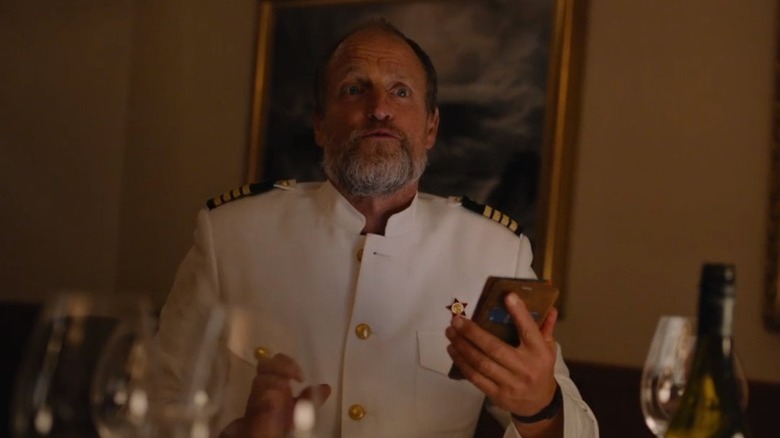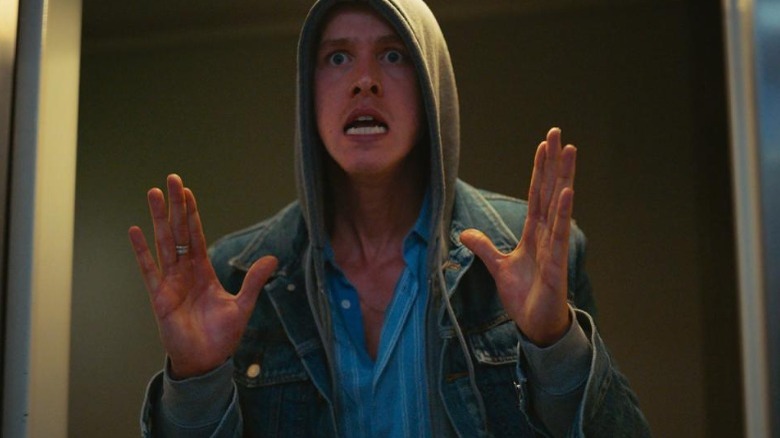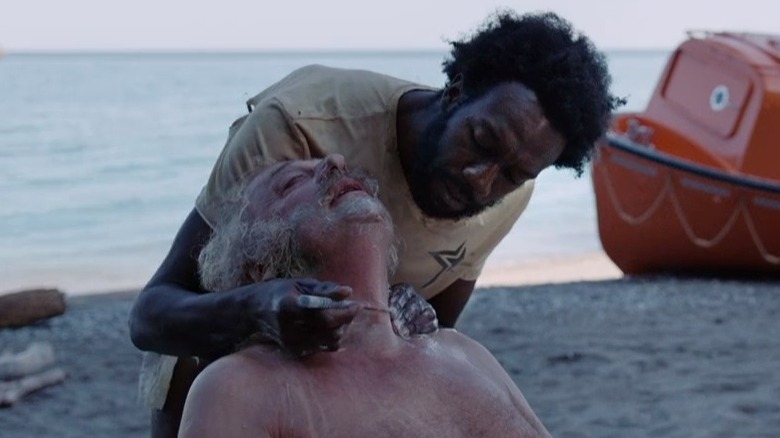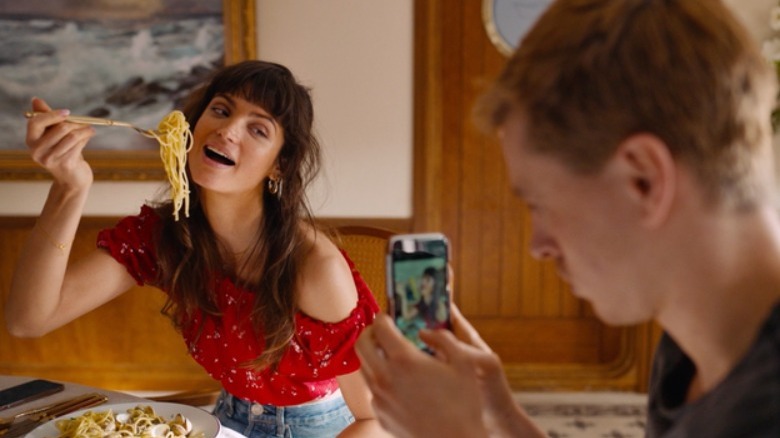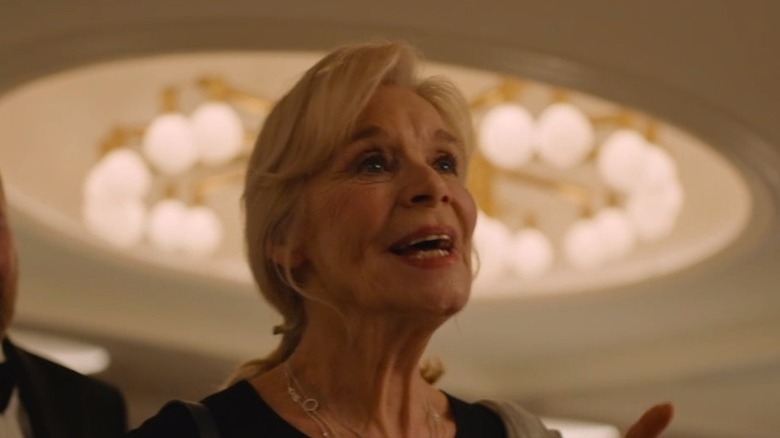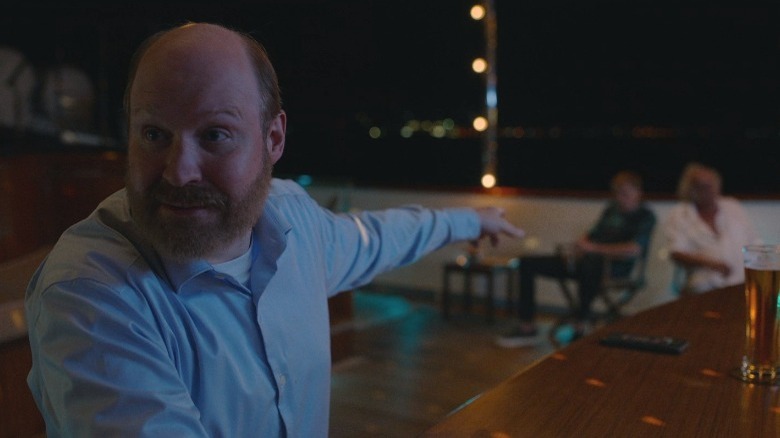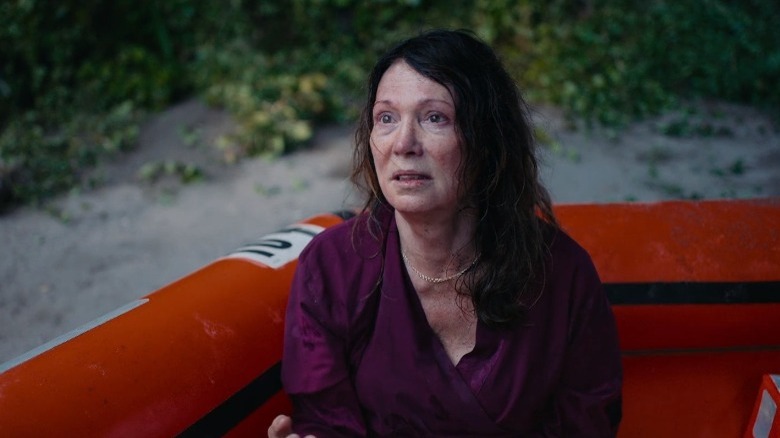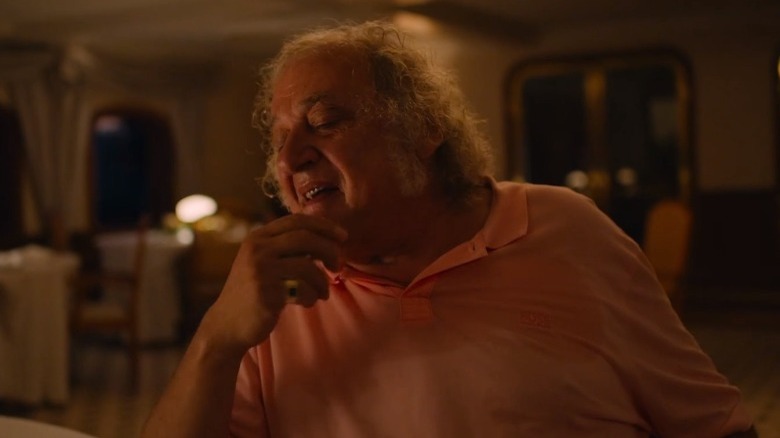The Ending Of Triangle Of Sadness Explained
"Triangle of Sadness," which gets its name from the area between your eyes and nose where worry and frustration tend to show up, is ready to make you laugh. Packed with expertly simmering tension, sudden reversals of social order, and unbearably awkward pauses, the film is an absolute riot. Ruben Östlund's satire takes no prisoners even while it acknowledges the deep pain caused by capitalism as it exposes the bitter irony of the class system.
With Oscar nominations for best picture, best director, and best original screenplay, "Triangle of Sadness" has cemented itself as one of the best satires of all time. One of the film's most incredible scenes reminds us that even the wealthy suffer from gastrointestinal distress. The film ends on a tense cliffhanger, leaving us to make meaning for ourselves back in the chaotic world of haves and have-nots when the credits roll. Lets sort out the ambiguity from the starkly obvious, take a ginger candy for motion sickness, and see what we're left with. This is the ending of "Triangle of Sadness" explained.
Did Abigail kill Yaya?
Not to spoil a series finale from 2007 but we'll never actually know: writer-director Ruben Östlund leaves us perilously in the dark as "Triangle of Sadness" cuts to black. Yaya's fate is as open to interpretation as Tony Soprano's, and there's more to be gained from wondering about it than hounding the filmmaker for an answer. Despite only being glimpsed briefly in the movie before the third act, actress Dolly De Leon really makes us feel the tension and despair in Abigail's face as she wrestles with her choice. Does she bash Yaya's head in with a rock and buy herself more time atop the new social pecking order? Or does she ascend to the resort and become as invisible as the world expects her to be again?
Yaya's vague offer to help Abigail "somehow," possibly as her assistant, couldn't have sounded more distant or hollow. As she wearily points out to Yaya, Abigail doesn't have children to return to, and only the remote potential of returning to her job as a toilet chief to look forward to if they take that infernal elevator to luxury. All she has to do is become a murderer to remain the queen of an inverted world. But to do so would mean losing her humanity.
Why was Carl running up the mountain?
To be precise, "Triangle of Sadness" doesn't cut right to black: we get a brief glimpse of Carl (Harris Dickinson) running and calling for Yaya before the credits roll. We might think from his urgency that he's coming to find her because they've made contact with more locals on the other side of the mountain. Given the proximity of the luxury resort that Yaya and Abigail stumbled onto, they were probably not far from civilization the entire time and just didn't think to look.
A much more real possibility could be that Carl's general unease with his girlfriend and his pretzel mama's jaunt over the mountain had gotten the better of him — that perhaps on some instinctive level, he sensed the violent potential of their encounter. Just as Carl was jealous and possessive of Yaya when she smiled at another man (in a way that apparently cut through his superficial desire to be "equals" in terms of money), it might have occurred to him that Abigail the provider could feel that way about him. And to think about how he felt guilty, but also relieved, about getting the shirtless deckhand fired. What might Abigail return, alone, feeling guilty but relieved about?
A perfect storm (of vomit)
In terms of visceral panic, "Triangle of Sadness" more than qualifies as a disaster film by the virtue of the slow-building, symphonic scene that sees the most cinematic fake puke since "The Meaning of Life." Östlund's screenplay brings together an astounding amount of small things that have to go just specifically wrong in order to bring this scene to its boiling point. A drunken and negligent Captain Thomas (Woody Harrelson) schedules the Captain's dinner for Thursday while sailing through a high-pressure zone. In his absence, with no clear power dynamic between his first mate Darius (Arvin Kananian) and chief stew Paula (Vicki Berlin), they fail to stand up to Vera (Sunnyi Melles), the billionaire's wife that insists the entire crew go swimming to satisfy an imaginary moment of solidarity.
The half-hour delay from the swim, of course, sets off multiple ripple effects. The multiple-course dinner of seafood is left to partially spoil — each course consisting of the kind of garish, protein, and sodium-heavy dishes that seem like they are some sort of rich person prank. Despite the richness, if the passengers had eaten 30 minutes earlier they might have had full stomachs, which we learn multiple times make seasickness easier to bear — though the staff conveniently fails to mention that alcohol definitely makes it worse. All of this conspires to a frenzy of bodily functions that crests when Vera tries unsuccessfully to quell her nausea with champagne.
The quote off
"Triangle of Sadness" follows its show-stopping ballet of bodily functions with a surreal exchange of ideology between the increasingly drunken Captain Thomas and Russian fertilizer mogul Dimitry (Zlatko Buric). They trade quotes and do a backward re-litigating of the underlying ideas behind the Cold War — this time it's an American Marxist ship captain against a dedicated Russian capitalist rich enough to buy the entire boat.
Dimitry opens with a couple of jokes from Ronald Reagan about how socialism doesn't work and eventually works his way through Margaret Thatcher and John F. Kennedy's quotes. Captain Thomas, though he admits he's not the best socialist himself in his stately cabin, starts with the more populist view of writers like Mark Twain and Edward Abbey, before jumping right into the rhetoric of Marx and Lenin themselves.
For the rest of the second act of the movie, the Captain and Dimitry go through the same strange motions the world has since the Cold War ended and play a late-stage capitalism drinking game. The rules of the game are simple — Dimitry has to try and predict whether a playing card will be "red or black," and every time he's wrong he has to drink. The only guarantee is that someone's getting wasted. Eventually, Captain Thomas commandeers the intercom and points out that there's no difference between the justifications we make to ourselves (quoting Noam Chomsky) and the machinery of war, assassination, and political overthrow that the capitalist nations of the world have become, invoking a speech from one of history's most famous socialists, Eugene Debs.
It's not sexy to talk about money
Like a palindrome, "Triangle of Sadness" parallels its subdued first act about Carl and Yaya's dispute over the check with the inverted stakes of the third act on the island. With the same showmanship of Christopher Nolan's "Inception" and its layered dream sequences, "Triangle of Sadness" transports Carl and Yaya to a world with inverted gender dynamics. But the same cold truths exist and show them who they really are. It takes the better part of an entire evening to just be able to talk about money, the underlying assumptions of gender roles, and the real imbalances in a patriarchal world, especially in the beauty industry.
By contrast, it only takes a few days of Carl and Abigail's "secret" liaisons in the lifeboat for them to end up in one of the same "what are we really doing here?" relationship conversations, but they have the same anxieties and stigmas that he and Yaya did earlier. It's not sexy to talk about money, and it's not even money that you're really talking about.
It's about survival, providing resources, and the bitter fact that love and romance can't exist in a fairy tale world that exists apart from those paycheck-to-paycheck concerns. Regardless of politics or beauty standards, it's the same hunger and need that makes us all human, and that life in the civilization we've stumbled into requires avoiding talking about money, for fear of bringing up what money represents.
Was Nelson one of the Pirates?
Perhaps overshadowed by the cliffhanger of Yaya's fate is one of the smaller mysteries of "Triangle of Sadness": the ambiguity of the identity of Nelson (Jean-Christoph Folly). Unseen before the survivors wash up on the island, Nelson claims to have worked in the ship's engine room. On such a massive luxury cruise staff, it's more than plausible that Nelson really was an employee that just managed not to cross paths with either Paula or Abigail during the voyage. But as the suspicious Dimitry points out, there's no way to really know for sure.
"Triangle of Sadness" never answers the question definitively, because once you're struggling to survive on a beach together it hardly matters. There's no difference between a pirate and a billionaire if neither of them knows how to fish, and Nelson and Dimitry go from confrontation to the easiest of friends within a few days. Dimitry even is comfortable enough with Nelson to have him shave his beard, even while still semi-ironically peppering him with questions about what life as a pirate is like.
You mostly get free stuff
"Triangle of Sadness" wouldn't have anything approaching the satirical bite it does if it were all about rich people like "Succession," or even just about the divide between the very rich and very poor. Our main point-of-view characters in "Triangle of Sadness," Carl and Yaya, aren't rich or poor. They're certainly doing all right but they get their cards declined sometimes, and it takes them several rounds of a maddening fight to psych themselves up to be honest and open about money the way the rest of the sociopaths on the yacht are. Their currency is their appearance — they are there to take pictures of themselves being rich, but only because they're a kind of wealth that we can't look away from.
In a way, they represent all of us at our most desperately aspirational and vain — the ache we feel when we're scrolling social media to be the ones so admired and loved and popular. But in a very "careful what you wish for" twist, they're confronted on the island with the fact that it is only their looks that they have to offer. In the end, there is no difference between selling your image and selling your soul. At least all the other people that sold their souls got rich.
Did the yacht have sails?
A running joke involves the ability of the rich to distort reality — especially in the luxury service industry — where the customer is not only always right, but they're utterly infallible. When Paula encourages the staff, she tells them to say yes to the guests, even if they ask for a unicorn. A woman identified in the credits as only "Dirty Sails Lady" (Mia Benson) corners Paula and eventually Captain Thomas himself to complain that the sails of the yacht were dirty, ruining her otherwise perfect view of the sunset.
The punchline, which Thomas has the temerity to deliver to her face, is that the ship is motorized, and thus doesn't have sails. The truth hangs in the air of the dining room for just a moment, before the woman gets the captain himself to back down and say they'll look into it. He may be the captain, but the cruise and the performative ritual of even the "Captain's Dinner" itself are the results of centuries of ostentatious wealthy tradition, a force that rewrites history in the moment and only flows in one direction.
The lonely billionaire
Arguably the most endearing of the soulless rich people we meet on the yacht is Jarmo (Henrik Dorson), a tech executive that's depicted with more basic humanity than say, "Glass Onion" and its definitely not Elon Musk main character. At first glance, sitting alone at the bar and working up the nerve to approach Yaya and Ludmilla (Carolina Gynning), Jarmo strikes Carl and Dimitry as hapless and sad. He has neither Carl's looks nor Dimitry's decades of wealthy confidence built up.
But their smirks quickly vanish when they realize that Jarmo is not only rich but still has the genuine warmth and generosity of the formerly middle class. They sulk and eventually round up their female companions after Jarmo buys everyone champagne, and offers to buy the women Rolexes. Putting the logic of the opening scene with male models into practice, Jarmo reminds everyone that it's actually more fun to smile, even if it doesn't sell Balenciaga.
Therese in the clouds
Actress Iris Berben bails out "Triangle of Sadness" by giving a performance of genuine depth and empathy with hardly any words in the character of Therese, a rich yacht passenger whose stroke has left her largely paralyzed and nearly mute. She has full control of only her right arm, and can only say the phrase "in the clouds" in German along with simple things like "nein" for "no" and her husband's name. Her disability is a source of awkwardness on the cruise, but on the island, she's only marginally more useless than all of the other able-bodied, non-Abigail survivors.
Despite the lack of vocabulary, Therese seems to flourish (relatively) on the beach, befriending Thomas and working out a rudimentary sign language that relies more on tone. They even play a homemade version of backgammon as they trade stories. Without language, we feel Therese's frustration as she attempts to alert the merchant that finds them on the beach to their situation. Language is only barely necessary for survival — the word "help" would have really helped Therese out — but most of what we say is with our head in the clouds, so to speak.
Did Dimitry buy the yacht?
A final mystery of "Triangle of Sadness" is whether Dimitry, seeming the richest of the guests, really became the new owner of the yacht. In the practical sense, there isn't much difference between doing so and being rich enough to do so, since the threat of his wealth is what made the entire crew listen to the whims of his wife. An avatar for the endless void at the center of capitalism, Dimitry gets on the ship's loudspeaker and tells everyone they're doomed. Late stage capitalism lurches to the end stages, belching and making prop bets for its own amusement along the way.
On the beach, however temporary, Dimitry is as useless as anyone else, and in perhaps the least subtle moment of the film immediately resorts to quoting Karl Marx's famous "From each according to his ability, to each according to his needs." His wealth has sunk to the bottom of the Mediterranean Sea, and he'll shine a flashlight at Abigail's feet to survive. Money can help provide resources. But wealth is no good when you're hungry — instead, it's a grenade that lands at your feet.

